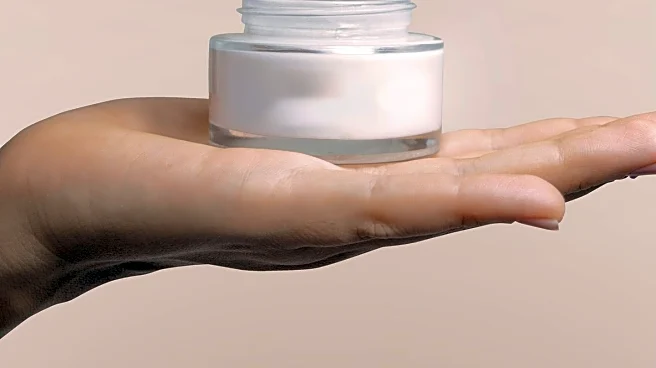What's Happening?
Slugging, a Korean beauty skin care practice, is gaining traction as a method to keep skin moisturized during the winter months. The technique involves applying petroleum jelly, such as Vaseline, Aquaphor, or CeraVe, to the face to lock in moisture overnight. This method has gone viral on TikTok, with over 500 million views under the hashtag #slugging. Dermatologists like Dr. Hadley King and Dr. Debra Jaliman have weighed in on the trend, noting its effectiveness for dry skin but cautioning against its use for acne-prone skin due to potential pore clogging. Slugging is most effective when combined with humectants like hyaluronic acid or glycerin, which help retain moisture.
Why It's Important?
The popularity of slugging highlights a growing interest in affordable and effective skin care solutions, particularly during the harsh winter months when skin tends to dry out. This trend underscores the influence of social media platforms like TikTok in shaping consumer beauty practices. For individuals with dry skin, slugging offers a simple and cost-effective method to maintain skin hydration and health. However, it also raises awareness about the need for personalized skin care routines, as the technique may not be suitable for everyone, particularly those with acne-prone skin.
What's Next?
As slugging continues to gain popularity, it is likely that more consumers will incorporate this technique into their nightly skin care routines, especially during the winter. Dermatologists may see an increase in consultations related to skin care practices influenced by social media trends. Additionally, beauty brands might capitalize on this trend by developing products specifically designed for slugging, potentially offering formulations that combine occlusives with humectants and emollients for enhanced effectiveness.
Beyond the Headlines
The slugging trend reflects broader shifts in consumer behavior towards DIY beauty solutions and the democratization of skin care knowledge through social media. It also highlights the importance of understanding individual skin needs and the potential risks of following viral trends without professional guidance. As consumers become more informed, there may be increased demand for products that cater to specific skin types and conditions, driving innovation in the beauty industry.









